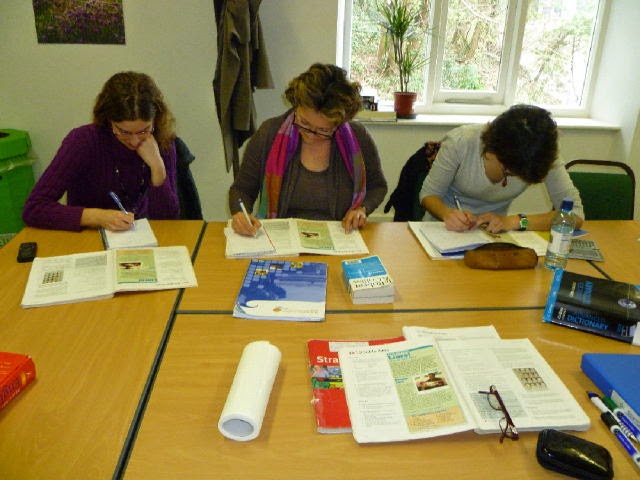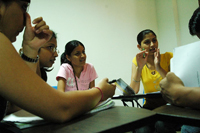“The role of the teacher is to create conditions in which learning can take place.”
(Scrivener, 2006)
After a month break, we are back to school again. A mix of feelings involves us teachers who wanted to rest a little more, but at the same time, were missing teaching and the school environment. I bet most of you teachers went back to your schools for your training week with a “bag full of new ideas,” willing to learn and share, and anxious to know your new groups. And when the classes start, here we go again: nice groups, not so nice groups, cooperative groups, parents to deal with, loads of tests and homework to correct, and the good old question: What about classroom management?

Wikimedia Commons: Buyerlerdeqalardim
Wrongly, classroom management has been understood as something that regards students’ behaviour in the classroom and how teachers can deal with it more effectively.
According to The Glossary of Education Reform, “Classroom management refers to the wide variety of skills and techniques that teachers use to keep students organized, orderly, focused, attentive, on task, and academically productive during a class.”
Classroom management involves more than just discipline. It has to do with the several ways teachers find to manage everything in the classroom, including the management of themselves. When classroom-management strategies are executed effectively, teachers minimize the behaviours that impede learning for both individual students and groups of students, while maximizing the behaviours that facilitate or enhance learning.
1. Managing the teacher:
Dealing with students of any age is not an easy job at all. Building rapport with students can be a remarkably effective way to improve classroom management. To build genuine rapport, you have to draw students to you. You have to use your personality, your humour, and your charisma to get students to want to be around you and take an interest in who you are.
Some tips:
- Project a friendly, caring, respectful persona. The tone of your voice, the way you monitor your students, and walk around the classroom will make a huge difference.
- Avoid mechanical behavior.
- Don’t elicit in a rote manner. Vary! Change! Be Creative!
- Don’t talk too much. Students’ talking time is of great value for the learning of a second language - help them build up their knowledge and sense of achievement;
- Connect with your students: Learn about SS lives, needs, and difficulties and try to be friendly and sympathetic. You’ll probably become a memorable teacher.
- Smile until they smile.

Wikimedia Commons: Shane Global
2. Managing materials, activities, and instructions:
The classroom should be arranged to promote efficient learning and minimize behaviour problems. Students must be able to see and hear instruction and have efficient access to learning materials. The teacher should be able to easily monitor students and provide feedback. The classroom should also be flexible to allow for different types of learning activities.
Tips:
- Organize materials in advance: The purpose of organizing materials is so that both students and teachers can have access to the correct materials with a minimum of disruption.
- Be sure you are familiar with the equipment to be used (computers, ITWB, worksheet, videos, CDs, games, Coursebooks, etc.). This avoids embarrassment and shows professionalism.
- Choice, sequence, and use of activities: This is the key point to keep your class on the right track. It’s crucial for teachers to be aware of what will keep the students engaged in the classroom. So start with a bang in order to motivate your students. Choose activities that match your groups, and be sure each activity has a purpose centred on the learner.
- Design activities that allow students to work together: pair and/or small groups.
- Vary patterns of interaction (group composition).

Flickr cc: ELTpics
As for instructions…
- Prepare your instructions in advance and Sequence them clearly.
- Make sure you have the class full attention and establish eye contact.
- Be brief: Break longer instructions into meaningful chunks.

Wikimedia Commons: Shane T. McCoy
3. Managing Discipline:
“Teachers should not be afraid of noise. Teachers should not be afraid of silence.”
Is discipline a scary word for you? There are many reasons why discipline can be a problem in your classroom. The causes of students’ misbehaviour have different origins, and it’s up to the teacher to use knowledge and wisdom to deal with it. Not easy at all! Furthermore, if you have to access parents to deal with their children’s misbehaviour, this might become a really stressful task. However, we should never forget we are teachers - and if you teach from the heart you will find your own way to deal with it.
Some very simple tips for managing discipline that have worked for me are:
- Set of rules and regulations for classroom management and discipline at the very beginning and negotiate a class contract with your students.
- Let your students know what behaviour you expect from the, along the course.
- Listen to them.
- Take time to remind students of your expectations and the applicable rules on a regular basis.
- Provide parents and school administrators with information on your rules, regulations and expectations.
- Conduct each class with a structure and professionalism.
- Make partners along the way – A good talk to the previous teacher is always of great help!
- Address your students appropriately and treat them with respect care and fairness (C Rogers).
- Discipline students appropriately, not more or less they deserve.

Wikimedia Commons: Aryanaslam
I wish you all a great restart. Break a leg and enjoy your teaching this year!
Roseli Serra, the ESL Editor for Wandering Educators, is an educator from Recife, Brazil, where she lives and works. She started as a private teacher of English and Portugues at the age of 17 years, and has a degree in Psychology and in Arts & Humanities, majoring in English, Portuguese, and Literature in English and Portuguese. She’s post graduate in Applied Linguistics for ELT. She’s also an ELT and consultant, E-Moderator, teacher, teacher trainer, mentor, Cambridge Examiner, and Materials Writer. Roseli has been in the field of ELT/ ESL and EFL for over 30 years now. She loves writing, mentoring, and mainly sharing about education. She loves working with technology and teaches different age groups, from 10 year-old students to adults. She has also experienced being the DOS of a language institute in Brazil for many years. You can find her online at http://roseliserra.blogspot.com.br
Classroom management has to do with the several ways teachers find to manage everything in the classroom, including the management of themselves.
Posted by:
Roseli Serra
